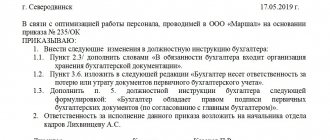What should an employer do if an employee refuses to sign a new job description?
Or here’s another from another Letter:
In its letter dated August 9, 2007 No. 3042-6-0, Rostrud recommends that employers develop and approve job descriptions for each position available in the staffing table, including vacant positions (which once again emphasizes the impersonal nature of the instructions). In this case, a person, applying for a job in a certain position, will have a complete understanding of the work ahead, the composition of his job responsibilities, what he needs to know and be able to do to perform it, what he will be responsible for, etc.
The basis for the development of job descriptions are the qualification characteristics (requirements) for employee positions, which are approved by the Ministry of Labor and Social Development of the Russian Federation.
- The job description is an annex to the employment contract.
In this case, it is an integral part of the employment contract and, therefore, is accepted with mutual consent of the employee and employer and signed by them. At the same time, the employer cannot independently, unilaterally accept the job description and establish any conditions in it.
- The job description is drawn up as a separate, independent document.
Thus, if the job description is an annex to the employment contract, the employer can make changes or additions to it:
- or by agreement with the employee;
- or without the employee’s consent, in the manner provided for in Art. 74 of the Labor Code of the Russian Federation, which is possible only in certain cases, in compliance with established procedures (warning the employee two months before the introduction of amended provisions of the instructions, etc.) and only on condition that the employee’s labor function remains unchanged. In this order, the employer can make changes regarding, for example, the subordination and interchangeability of the employee, qualification requirements for him, grant the employee additional rights, etc. But an employer can assign additional responsibilities to an employee, that is, change his job function, only with the written consent of the employee.
If the job description is an independent local regulatory act, then the employer has the right to make changes to it without the consent of the employee. In this case, the employer approves the amended or supplemented version of the instructions, puts it into effect by order and introduces it to the employee against his signature. But, as in the case discussed above, unilateral introduction by the employer of changes or additions to the employee’s job description, if such changes affect the labor function, is allowed only with the written consent of the employee.
The job description, as a rule, is drawn up in two copies, one of which, at the request of the employee, can be given to him. (Letter of Rostrud dated October 31, 2007 No. 4412-6)
refusal to sign in the job description, what to do!?
Staying on the project territory without badges is PROHIBITED and IMPOSSIBLE!!!! A mandatory condition for issuing a badge is to take photographs against the background of the press-wall of the Culture Center and certify it with a seal. The cost of a photo is 50 rubles.
When registering with the ORGANIZING COMMITTEE, the leader submits:
· Order for the travel of children and the appointment of a responsible person for this trip.
· A copy of the Application - consent for the child to leave and stay in the Krasnodar Territory (sample attached) + photocopy of page 1 of the passport (the original application remains with the team leader)
· Attachments to the information letter
· Statement from parents of children participating in the festival who are part of the festival group (sample in attachment)
· List of delegation (according to the established form)
Please note that the application - consent for the departure and stay of the child on the territory of the Krasnodar Territory is made FOR ALL participants of the delegation under the age of 18 traveling to the project without legal representatives (mother and father, or persons equivalent to them (official guardians)). If a child is traveling with a grandmother or another relative, then this application - consent is issued to this relative. If it is not possible to obtain consent from the second parent, then the application must be completed from one parent.
All consent statements are written by parents themselves!!!! The signature on the consent must match the signature on the passport!
- Opening
To participate in the Opening Ceremony, ALL teams must prepare the following:
- business card of your team (lasting no more than 2 minutes)
The group's business card is presented in a musical-poetic, musical-choreographic format, without the use of video projections and photo slides. In the business card, you briefly talk about your team, how you prepared for the train, what you expect, etc. The room format is “cabbage maker”, business cards are presented on stage during the opening!
We ask you to approach the preparation of your business card with all responsibility.
At the opening of the project, all teams need to make their own star with the name of their team and city, show your imagination, your star will become your talisman for the entire period of the project and will take pride of place in the constellation of this race!
- the flag or coat of arms of your region (if possible) on the flagpole.
Flags and coats of arms will be used during the performance of the bands and during the parade!
Excursion program
We ask you to familiarize yourself with the list of excursions! You can order them at your request upon arrival at the Iskra Hotel Complex!
You can receive more detailed information on all questions that interest you at the organizational meeting on July 8, 2017!!!
During the period of creative projects, there are shops with methodological literature, as well as souvenirs, including Kuchugur symbols, at LOW PRICES!!!! Don’t rush to buy magnets, plates, umbrellas and keychains in souvenir shops...... especially for you and your teams, we made a wholesale purchase of souvenirs and therefore the cost is much lower than in any other place!!!
During the competition program, our photographers and videographers work for you!!! You can order video shooting, select photos from performances, order a photo shoot, as well as order magnets, collages from your performance, calendars with your photo!!!
General provisions
- All participants (managers and accompanying persons) of the project are required to comply with the established rules of the project
- The Gala concert is formed EXCLUSIVELY based on the director's intention; your participation or non-participation in the Gala concert is not determined by the effectiveness of your performance! The list of participants of the Gala concert is approved by the chief director and is not subject to change!!!
- The jury and the Organizing Committee do not take into account material capabilities, social affiliations, nationalities and locations of participants - only creativity on absolutely equal terms, in accordance with the provisions of the festival-competition.
- The jury does not have the right to disclose the results of the Festival before the official announcement.
- The decision of the Jury is approved and documented in the protocol. The decision of the Jury is final and cannot be revised.
- The Organizing Committee is not responsible for grading by members of the Jury and awarding titles to participants.
- The organizers of the project are not responsible to the authors of the works and songs performed by the participants.
In the attachment we are sending you a plan - a grid of evening themed dance and entertainment programs.
The program is subject to change!!!!
Accommodation for your team will be sent to you 5 days before arrival!
The transfer time will be sent 2 days before arrival by SMS message to the phone numbers specified in the information letter and duplicated to your email address!!
The final version of the program, as well as the schedule of all creative events, you receive upon registration with the Organizing Committee!!!!
Dear leaders!!!
If your group’s repertoire includes numbers that are not included in the competition and festival program, but that correspond to the themes of our events, we will be happy to consider them for participation in entertainment programs.
Please notify us by email
[email protected]
attaching the soundtrack, title and brief description of the performance, as well as the direction in which it is presented, and also do not forget to take costumes for its presentation.
We ask you to sign this information sheet and send it to the address no later than June 10, 2020
I have read and agree with this information letter; in case of violation of the rules, the project management has the right to remove the team from participation.
Name of the group (full name of the contestant) ________________________________________________
____________________________________________________________________________________________
Manager___________________________ Signature__________________________
©2015-2018 poisk-ru.ru All rights belong to their authors. This site does not claim authorship, but provides free use. Copyright Infringement and Personal Data Violation
Job description. How to do without the employee’s consent to change it
When an employee has the right to challenge changes made to the instructions. In some cases, it is better not to draw up instructions as an appendix to the contract. What to do if an employee refuses to sign a new instruction
Disputes over whether an employee should perform a particular job often arise due to unclear job responsibilities. Often these disputes end in dismissal, which the employee manages to challenge on the grounds that the assigned work was not part of his job responsibilities. Only a detailed job description will help you avoid such consequences. However, the problem is that over time the employee's responsibilities may need to be adjusted. At the same time, he himself often does not agree to change anything in his functionality. However, this does not mean that it will not be possible to make changes to the job description without obtaining the employee’s consent. In such a situation, one should proceed from the fact that if the employee’s actual job function does not change, then the employer can specify the responsibilities without taking into account the employee’s opinion. But for this it is important that the instructions are not drawn up as part of the employment contract. If it is an annex to it, then any changes must be formalized through the procedure for changing the terms of the contract or with the consent of the employee. Otherwise, his refusal to perform new duties will be lawful. But even if the instructions are drawn up in a separate document and the employee is not assigned any new responsibilities, there are cases when he still refuses to get acquainted with its new edition. Practice shows that the employer has the right to demand compliance with it in this case as well.
It is better to issue the instructions as a separate document, and not as an annex to the employment contract
The job description is a local normative act, which is adopted and amended by the employer within the limits of his competence (Articles 8, 12 of the Labor Code of the Russian Federation).
This position is also confirmed by the explanations of the Federal Service for Labor and Employment (letter dated October 31, 2007 No. 4412-6), according to which the employer can independently decide how to draw up a job description and make changes to it, since the procedure for drawing up such instructions is not regulated by regulatory legal acts . A job description can be an appendix to an employment contract, or it can be approved as an independent document.
The execution of the job description as an annex to the employment contract will indicate that it is an integral part of it. It follows from this that if in the future the employer needs to make changes to it, they can only be made by agreement of the parties to the employment contract, in accordance with Art. 72 Labor Code of the Russian Federation. This is explained by the fact that since the job description forms a single whole with the employment contract, its change is carried out in the same manner as the change in the employment contract itself. To do this, the employer will need to enter into an agreement between the parties, which must be drawn up in writing (Article 72 of the Labor Code of the Russian Federation).
Taking into account all the above features, it becomes clear that it is better to draw up a job description as a separate document. To do this, it is necessary to issue an order for its approval, which is brought to the attention of the employee against signature. The law does not provide for a special procedure for approving a job description, so such an order will be quite sufficient.
Employer Behavior Options
The preparation of a job description can be done in two ways, each of which determines the employer’s behavior in the event of an employee’s refusal to sign this document.
Independent local act
The employer, when drawing up a job description as a local regulatory act, must approve this document and familiarize the newly hired employee with it.
In this case, the employee’s signature is placed at the end or separately on the familiarization sheet.
A job description as a local regulatory act is developed by the management of an enterprise not for a specific employee, but for a specific position.
With its help, the performance of labor duties within a particular position is regulated, regardless of who exactly occupies it and how many employees act in accordance with it.
On the other hand, as practice shows, it is possible to employ several employees in the same position: each of them may have an unequal range of responsibilities, which is reflected in different job descriptions.
To avoid disputes in the event of failure to fulfill established duties, it would be better for the employer to provide the employee with a second copy of the job description, duly certified.
Appendix to the employment contract
The second option for designing a job description involves its inclusion in the employment contract.
This means that it becomes a mandatory part of it, has equal legal force, and is used with the mutual consent of a certain employee and the head of the company.
The employer does not have the opportunity to independently adopt a new job description or change the conditions in the current one. It is customary to make additions to the document by concluding an additional agreement.
If their appearance is not related to changes in legislative norms, the employee’s consent is required to make changes.
Art. 19 of the Labor Code of the Russian Federation states that in this case the employee must be notified in writing.
Refusal to sign for reading the instructions does not mean that the employee is not familiar with them
If an employee refuses to sign for familiarization with the job description, the employer should draw up a corresponding document about this, which must be signed by several employees of the enterprise to confirm the fact of refusal (for example, this could be an HR manager, the head of the structural unit in which this employee works, an employee from security services). You can also send a copy of the job description, endorsed by the employer, with a covering letter to the employee by mail, keeping a list of the attachment with a postmark on dispatch. Compliance with these requirements will indicate that the employee has properly read the instructions.
Arbitrage practice. An employee of the company's product supply and logistics department was given a job description for her to sign, but she refused to sign. The employer drew up an act according to which this job description was first read to the employee, and then a copy was made and left on the employee’s desk. In addition, the fact that the employee received this instruction and familiarized herself with it was confirmed by her memo addressed to the manager, in which she expressed her disagreement on a number of points. Under such circumstances, the court came to the conclusion that the plaintiff was properly familiarized with the job description and refused to satisfy the request to declare it invalid (cassation ruling of the Perm Regional Court dated July 27, 2011 in case No. 33-7533).
At the same time, it must be borne in mind that an employee’s disagreement with the job description may be grounds for refusal to hire. When drawing up a job description, the employer, at his own discretion, includes in it all the necessary information about the employee’s responsibilities corresponding to the position held.
Arbitrage practice. The applicant wrote an application with a request to be hired as the head of the laboratory of electrical measurements. Having familiarized himself with the employment contract, he signed it, but with comments on the job description, indicating that the clause on carrying out certain instructions of the head of the department should be excluded from it. This point, in his opinion, contradicted Art. 57 Labor Code of the Russian Federation. Subsequently, the employer refused to conclude an employment contract and permission to work, which served as the basis for the applicant to go to court. At the same time, the applicant insisted in the court hearing that the conclusion of an employment contract between him and the employer is possible only if the clause in the job description with which he did not agree is declared invalid.
However, the court did not support his position, since it did not establish any contradictions of the disputed clause with the provisions of Art. 57 Labor Code of the Russian Federation. The court also indicated that the employer has the right to independently, at his own discretion, determine the employee’s labor function and his responsibilities, taking into account the general qualification requirements for the position and the characteristics of his own production process (decision of the Moscow Regional Court dated February 21, 2012 in case No. 33-4738).
If the employee has already been hired, then his refusal in itself to sign for familiarization with the job description does not constitute a disciplinary offense, since it does not indicate the employee’s guilty illegal behavior. He has the right to refuse to sign, and the employer in this case should immediately record this fact. If in the future the employee refuses to fulfill certain duties set forth in the instructions, the employer will have every reason to bring him to disciplinary liability. At the same time, the employee’s disagreement with certain points of the job description is not grounds for its cancellation (ruling of the Lipetsk Regional Court dated November 23, 2011 in case No. 33-3234/2011).
What to do if an employee refuses to sign an order
When faced with obstacles to the implementation of the administrative document, the employer must take care of drawing up a document recording the attempt to conduct familiarization and the employee’s refusal to sign the order.
- How to write a memo: sample drafting rules
Although there are no uniform requirements for drawing up a document, refusal to sign a dismissal order presupposes compliance with the standards mentioned in GOST R 6.30-2003.
The act is classified as information and reference documentation, which includes 3 sections:
- An introductory part indicating the details of registration (number, date of the document) plus a description of the composition of the commission. The list of citizens on the commission changes over time.
- Description indicating the facts, circumstances of the case, with the formulation of conclusions in relation to a specific person holding a certain position.
- List of commission members who certified the employee’s refusal.
The text content also indicates the number of copies compiled. The document is drawn up with the participation of the personnel service and the involvement of 2 witnesses.
Registration procedure
To comply with legal requirements, the employer must take the following actions:
- If a person refuses to sign, recording his familiarization with the order, the administration invites 2-3 employees who will serve as members of the commission. When selecting the composition of the commission, they try to avoid including direct subordinates.
- The employer, in the presence of witnesses, offers the employee an order to review and sign.
- If an employee verbally declares his reluctance to get acquainted with the order, it is read out in the presence of the commission.
- An act is drawn up recording the refusal to sign. To save time, the form can be prepared in advance, knowing that the person disagrees.
- The document is signed by members of the commission and the employee, if he expresses a desire to record his refusal in writing.
- An entry “Refused to review” is included in the act, confirming the fact with the signatures of witnesses.
The recording of disagreement with signing and familiarization is done manually, and the form itself can be printed on a printer in advance.
Download: Certificate of Refusal to Sign (form in Word) (25.5 KiB, 777 hits)
Upon completion of the paper, you must register it by assigning a number and indicating the date.
The employer himself is interested in the correct execution of the act and its subsequent storage at the enterprise, since this is the only paper that will help prove that the administration has taken measures to inform the person. For the person who refused, the presence or absence of the act does not make any legal difference, but for recovery after an inconsistent dismissal, justification for the lack of notification will provide serious assistance.
Changing an employee's job responsibilities does not always require his consent
If it is necessary to change the job description, the employer must take into account the already mentioned letter of Rostrud dated October 31, 2007 No. 4412-6, containing clarifications on this issue. If changes to the job description are associated with a change in the mandatory terms of the employment contract, in particular the labor function, then in this case the requirements for advance written notification to the employee must be met. In such a situation, changes to the job description can be made only after the employee agrees to continue the employment relationship (Article 72 of the Labor Code of the Russian Federation).
Arbitrage practice. The employee was hired by the company as an engineer. As a part-time job, he was entrusted with performing the functions of an electrician. After some time, the employer decided to change the employee’s job description and charge him with the duties of performing functions that were previously formalized as a combination of professions. The employee did not agree with this and went to court. The court reviewed the case and came to the conclusion that such changes to the job description are illegal. He pointed out that this significantly changes the employee’s job responsibilities, since he is assigned the functions of working specialties. In fact, there was a transfer to another job, to which the employee did not give his consent. The court declared the employer’s actions illegal and ordered him to cancel the controversial instruction (decision of the Moscow City Court dated February 10, 2012 in case No. 33-3987).
Similarly, in another case, the court declared unlawful the employer’s order to make changes and additions to the job descriptions of employees. The court found that with such an order the employer actually unilaterally changes the previously defined terms of the employment contract. This order imposed additional duties on employees, established a small additional payment, and explained the consequences of refusing to work. The court concluded that the employer did not provide evidence of changes in organizational or technological working conditions, as well as the presence of other reasons why the conditions determined by the parties could not be maintained (cassation ruling of the Novosibirsk Regional Court dated January 27, 2011 in case No. 33-413/2011 ).
At the same time, approval or change by the employer of a job description does not constitute a change in the employee’s job function. If the scope of an employee’s job responsibilities listed in the instructions does not change his job function, then there is no reason to believe that such changes lead to an infringement of the employee’s rights (ruling of the Vladimir Regional Court dated January 19, 2012 in case No. 33-108/2012).
The instructions do not have to correspond to the qualification directory of positions
If an employer develops a new job description or makes changes to the current one, then it is important to take into account the provisions of the Unified Qualification Directory of Positions of Managers, Specialists and Employees, approved by Order of the Ministry of Health and Social Development of Russia dated July 23, 2010 No. 541n (hereinafter referred to as the Directory). The fact is that the professional responsibilities of the employee, enshrined in the job description, must correspond to the job responsibilities of the position specified in the said Handbook. At the same time, as noted above, the approval of the job description should not significantly change the employee’s job responsibilities, since this would be a violation of the provisions of Art. 57, 60, 72 of the Labor Code of the Russian Federation (determination of the Supreme Court of the Komi Republic dated July 16, 2012 in case No. 33-2986AP/2012).
Please note that the provisions of the job description regarding the definition of the scope and content of the employee’s professional duties may not completely reproduce the content of the above-mentioned Handbook. This is due to the fact that, based on the qualification characteristics set out in it, each employer develops job descriptions for its employees, taking into account their specifics. When drawing them up, the responsibilities stipulated in the characteristics are specified, taking into account the peculiarities of the organization of production, labor and management, technology for performing labor processes (determination of the Kemerovo Regional Court dated 02/08/2012 in case No. 33-1228).
The content of an employee’s specific actions may vary depending on the time, conditions and circumstances that he may encounter while performing his job duties. In these cases, the employee may be entrusted with performing duties provided for by the characteristics of other positions, the performance of which does not require another specialty and qualifications. A change in job responsibilities by the employer will not constitute a change in his labor function in the sense of the provisions of Art. 57, 60, 72 of the Labor Code of the Russian Federation (clause 4 of the Qualification Directory of Positions of Managers, Specialists and Other Employees, approved by Resolution of the Ministry of Labor of the Russian Federation dated August 21, 1998). Thus, the employee’s consent when changing duties will be necessary only if such changes affect the employee’s work function.
Must an employer seek employee consent to change a job description? Yes, any changes to the instructions are possible only with the consent of the employee No, if they do not relate to the employee’s job function No, changes to the instructions are possible without the consent of the employee In a letter dated October 31, 2007 No. 4412-6, Rostrud explained that in the case where a change in the job description is associated with a change in job function - the employer is obliged to notify the employee in advance in writing. In this case, changes to the job description are possible only after the employee agrees to continue the employment relationship.
Refusal of an employee to sign a job description
Believe me from the judicial practice and dispute resolution practice of the fed. labor inspectorate.
If the employee does not want to get acquainted with it under signature, draw up a corresponding act signed by two witnesses, to insure your position in case of possible litigation.
In this case, you will have to be guided by the Qualification Directory for positions of managers, specialists and employees (industry-wide).
The Labor Code of the Russian Federation does not contain an employee’s obligation to READ the job description. There is an obligation of the employer to NOTIFY the employee against signature with the job description (Article 68 of the Labor Code of the Russian Federation). That's all.
This is important to know: Act on improper performance and violation of official duties (sample)
Elena, the employee does not sign job descriptions; they are approved by the manager. But the employee is obliged to read the approved instructions and sign for familiarization. Further, depending on whether they are fulfilled or not, the manager takes action.









